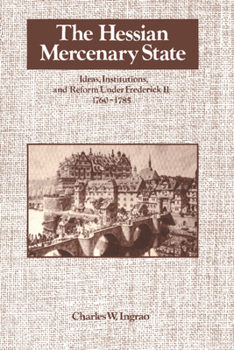The Hessian Mercenary State: Ideas, Institutions, and Reform Under Frederick II, 1760 1785
Select Format
Select Condition 
Book Overview
In 1776 Landgrave Frederick II of Hesse-Cassel dispatched 19,000 'auxiliaries' to assist the British in the American Revolution. While Frederick's action continues to color Americans' view of him, his 'enlightened' use of the funds from the soldier trade for domestic initiatives is less well known. In analyzing the origins, course, and effectiveness of domestic policymaking in Hesse-Cassel, Charles Ingrao finds that Frederick was neither as evil as we might think nor as enlightened as we might like to believe. By examining the interplay of Enlightenment ideas with entrenched Christian values, cameralist tenets, and militaristic tendencies, Professor Ingrao downplays the 'enlightenment' component in enlightened government. He also places greater emphasis on the constructive role and active cooperation of corporate bodies than have studies of similar states in the eighteenth century. The impact of the regime's numerous reforms was limited by its adherence to established values, its respect for existing institutions, its reluctance to sacrifice the welfare of any element of the population, and its failure to anticipate the unwelcome consequences of many of its initiatives. Professor Ingrao's findings stress the impracticality of dramatic change in the pre-revolutionary era - or in any pre-revolutionary society.
Format:Paperback
Language:English
ISBN:0521533228
ISBN13:9780521533225
Release Date:February 2003
Publisher:Cambridge University Press
Length:256 Pages
Weight:0.85 lbs.
Dimensions:0.6" x 6.1" x 9.0"
Related Subjects
HistoryCustomer Reviews
0 rating





